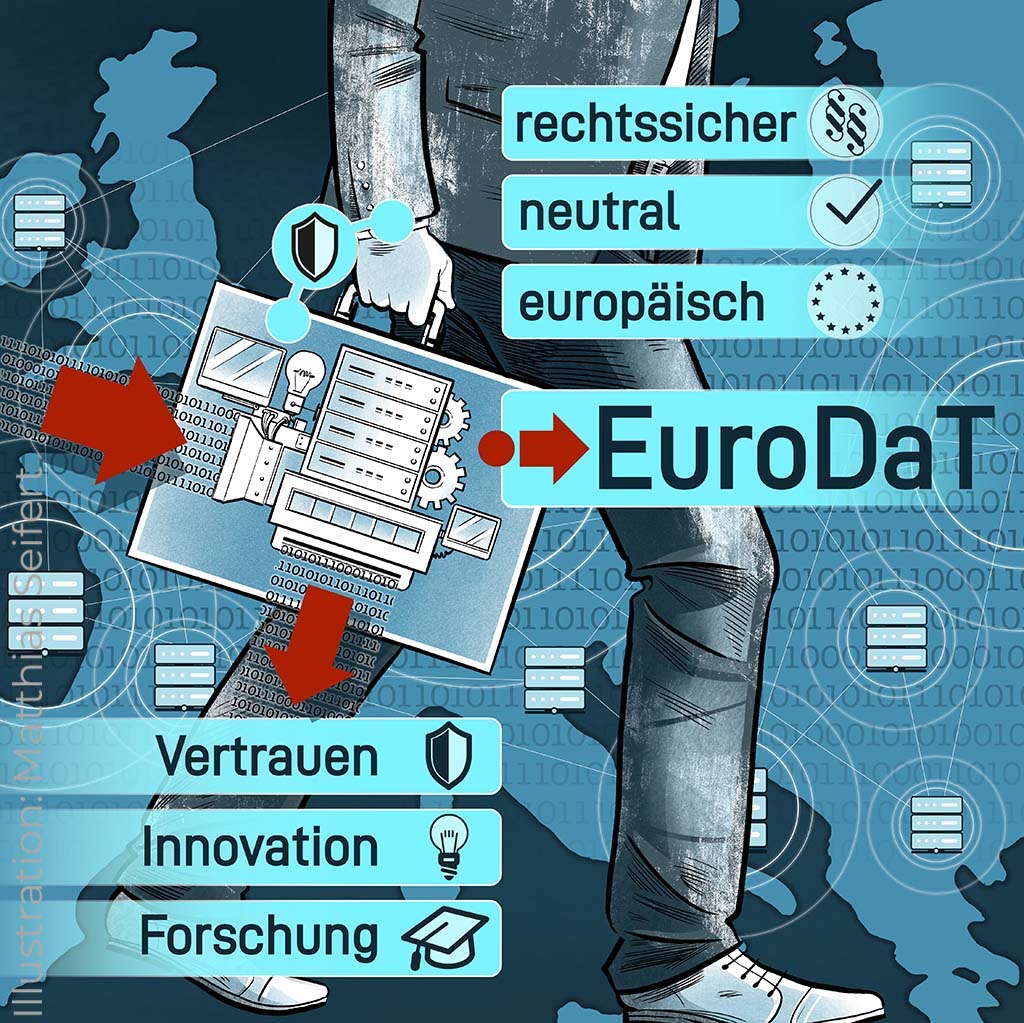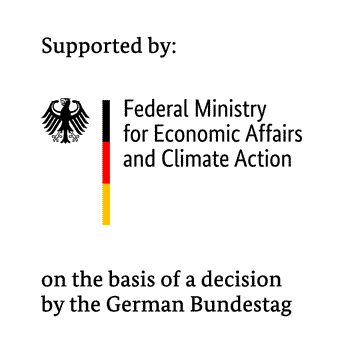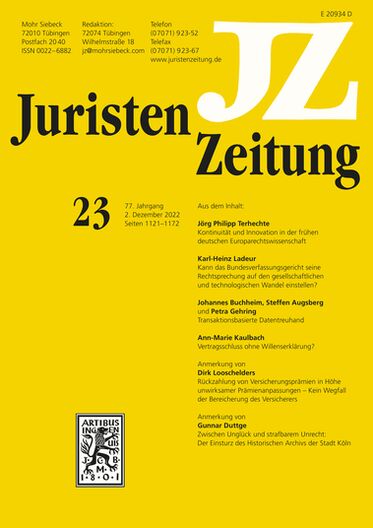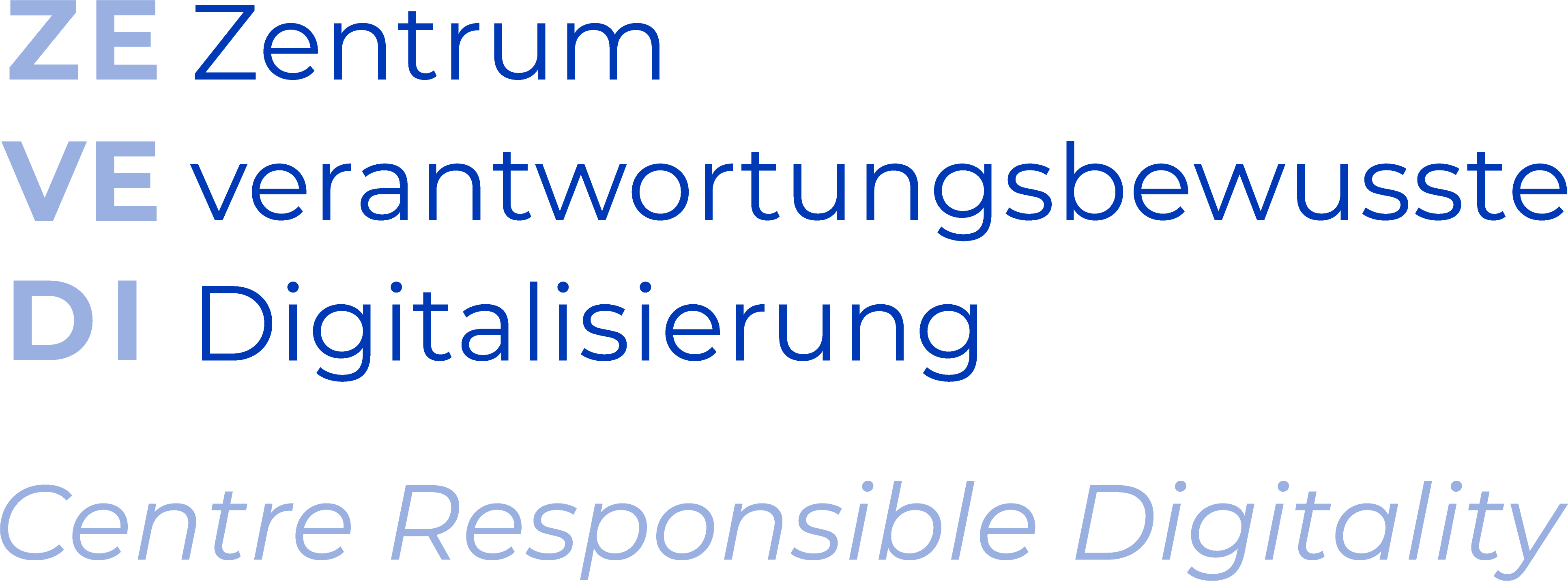Duration: January 2022 until June 2024

The EuroDaT project aims at creating a neutral, non-profit data trustee in accordance with the European Data Governance Act (DGA). The data trustee will be based on the federated data infrastructure provided by the Gaia-X initiative. It will enable reliable and secure exchange of data between private sector enterprises, public entities as well as research institutions and facilitate new ways of anonymous, independent data analysis. Thus, it will promote the development of innovative products and services as well as new data-driven business models based on AI techniques and big data.
Within the EuroDaT consortium the Centre Responsible Digitality (ZEVEDI) is in charge of the sub-project GovLegal and plays an important role with regard to the implementation of the data trustee, as it develops the necessary legal foundations in accordance with the DGA. Moreover, the participating scientists of the ZEVEDI network provide their expertise concerning the realisation of concrete, practice-related business use cases. In doing so, they closely cooperate with eleven partners from the public and the private sector: Atos, d-fine, Deloitte, German Research Center for Artificial Intelligence, Goethe-Universität Frankfurt am Main, Hessian Ministry of Economic Affairs, Energy, Transport and Housing, Institute of Legal Informatics of Universität des Saarlandes, Leibniz Institute for Financial Research SAFE, Lexemo, TechQuartier, T-Systems International.
ZEVEDI supports GovLegal with a supplemental ad hoc project which is supposed to analyse the conditions of success or failure of complex interdisciplinary cooperation between scientific, economic and political / administrative actors. On this basis it systematically identifies potential deficiencies and derives recommendations on how to improve collaboration within the EuroDaT consortium in general and within the sub-project GovLegal in particular.
The project is funded by the German Federal Ministry for Economic Affairs and Climate Action.

Principal Investigators
Prof. Dr. Petra Gehring, Technische Universität Darmstadt | head of the sub-project | more information
Prof. Dr. Steffen Augsberg, Justus-Liebig Universität Gießen | more information
Prof. Dr. Johannes Buchheim, LL.M. (Yale), Philipps-Universität Marburg | more information
Prof. Dr. Michael Kling, Philipps-Universität Marburg | more information
Prof. Dr. Florian Möslein, LL.M. (London), Philipps-Universität Marburg | more information
Prof. Dr. Sebastian Omlor, LL.M. (NYU), LL.M. Eur., Philipps-Universität Marburg | more information
Prof. Dr. Anne Riechert, Frankfurt University of Applied Sciences | more information
Steffen Augsberg & Johannes Buchheim
Von der Verarbeitung personenbezogener Daten zur personenbezogenen Datenverarbeitung
Zugleich eine datenschutzrechtliche Erläuterung und Einordnung des Modells der transaktionsbasierten Datentreuhand
What forms of data handling harbour risks for personal freedom and equality, to which data protection law has been responding since its inception? Almost 50 years after the first BDSG came into force, we can no longer answer this question abstractly on the basis of the data processed, but only by looking at the specific form and epistemic purpose of the respective data processing processes. Based on this insight, the article shows how the deliberate, technically secure design of data processing processes, in particular through the involvement of data trustees, enables non-personalised use of personal data sets. In this way, the informational potential of data can be used more comprehensively without data-related anonymisation and encryption efforts, without having to give up legitimate interests in shielding information.
Published in: JuristenZeitung (JZ) 79, H. 23/2024, S. 365-375
link to article


Johannes Buchheim, Steffen Augsberg & Petra Gehring
Transaktionsbasierte Datentreuhand
Nutzungsszenarien, Kennzeichen und spezifische Leistungen eines neuen Modells gemeinsamer Datennutzung
Today’s economy is data-driven and data is anything but scarce. Nevertheless, public authorities, private individuals as well as companies still have vast amount of data at their disposal that is unused thus far, partially due to legal hurdles. Therefore, many current regulatory and data infrastructure initiatives aim for recovering these data treasures. Data trustees are considered to be a central tool for achieving this purpose. However, design and functionality of these entities often remain unclear. Thus, instead of linking ambitious expectations with a vague catchy buzzword, concrete concepts are needed. This is the objective of this article.
Published in: JuristenZeitung (JZ) 77, H. 23/2022, S. 1139–1147
link to article
Presentations of the Project
Modulare Vertragsgestaltung durch den Vertragsbaukasten in EuroDaT
Presentation at the Gaia-X Milestone Meeting | Munich, 28 & 29 June 2023
more on this event
The European Data Trustee – Neue Wege zur Datennutzung für Forschungszwecke?
Presentation at the scientific conference “Daten.Forschung.Zukunft” on the occasion of the 75th anniversary of DESTATIS | Wiesbaden, 6 July 2023
more on this event

